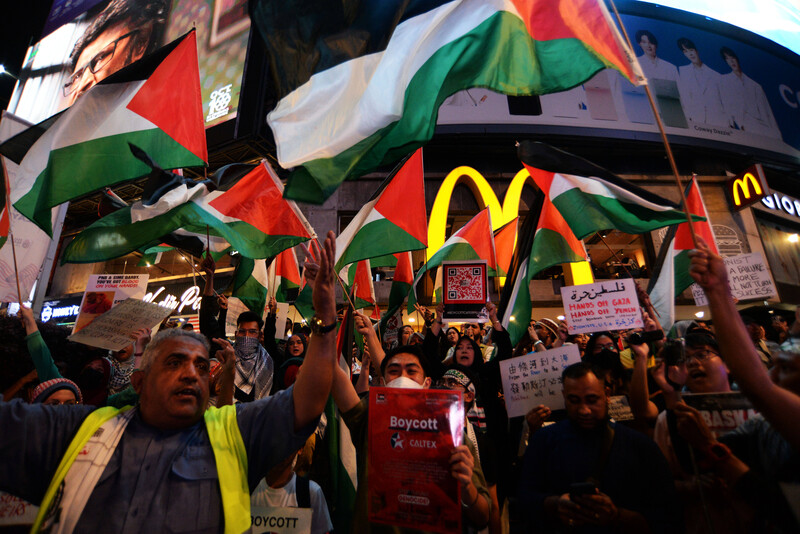The Electronic Intifada 17 December 2024

Protesters calling for a boycott of McDonald’s in Kuala Lumpur, Malaysia, 19 October 2024.
SIPA/NewscomThe first time I saw a McDonald’s was during my first week in Egypt, back in February 2024. The familiar logo stood out, but what caught my eye was the Palestinian flag hanging by the door.
The McDonald’s logo and the Palestinian flag, in my mind, did not belong side by side, as the boycott, divestment and sanctions movement (BDS) had advocated for a boycott of the American chain.
In October 2023, McDonald’s Israel offered free meals to Israeli soldiers, and a picture later surfaced of a McDonald’s paper bag, a rifle lying next to it, inside an Israeli tank in Gaza.
I walked closer to the restaurant out of curiosity and looked inside. There were no customers, just empty tables.
I told myself that the restaurant was empty because of the boycott, even though I could not know for sure. Still, it felt good to feel that there was a sense of solidarity and support for our shared struggle in Palestine. Yet, then again, maybe this McDonald’s in Mansoura, where I was now living, was just not a popular location.
As months went by, I kept an eye on this McDonald’s, and I noticed that it was not always empty.
Even when McDonald’s admitted that its international sales had slumped, this particular location in Mansoura, about two hours north of Cairo, seemed to be attracting at least some Egyptians.
This was troubling to me. I had been forcibly displaced from Gaza by the Israeli genocide, but it seemed that life outside of Gaza carried on, with little thought for the boycott.
My anger grew, along with my sense of powerlessness, as I noticed the widespread enjoyment of other products that those in solidarity with Palestine decided to boycott, including PepsiCo.
At the grocery store, I noticed a boy with his mother, asking her for a Pepsi. I stood there, hoping she would refuse. To my dismay, she bought the Pepsi.
I wanted to scream, to let out my frustration. Such a simple purchase might seem small to most, but having just been displaced from Gaza, I was in a sensitive and reactive state.
I grabbed a few Pepsi cans and shook them, hoping that when someone opened them, the soda would spray in their face. It was a childish act, but in that moment, it felt like my only way to resist.
My boycott plan
I made some boycott stickers and returned to the shop. I placed them on all the Pepsis and other products whose manufacturers are complicit in genocide.
The next day, I went back to check if the stickers were still there. They weren’t. Someone had ripped them off. I decided to put more stickers on the products.
This time, the store owner saw me and stormed over.
“What do you think you’re doing?”
I let him know I was reminding people of the boycott, but he wasn’t having it.
“Do you want to destroy my business? Get out of here!”
His words stung. Shaken, I left, wondering if I was in the wrong. Was I really hurting his livelihood?
Then, one afternoon, I found myself walking past that same McDonald’s I had once seen empty. I watched a young woman go in, disappointment swelling inside me.
How could she not know about the boycott?
This might be hard for some to understand, but the act of violating the boycott felt like ignoring the suffering that we in Gaza are enduring.
I approached her and explained why she shouldn’t eat there. At first, she was dismissive, but when she heard my accent and realized I was from Gaza, her attitude changed.
We talked for a while, and by the end of our conversation, she promised she would never eat there again.
The solidarity was real, I decided, even if some had grown lax about it. I could still see the love and compassion in people’s intent, though sometimes actions don’t align with words.
My stickers and my talks with strangers aren’t enough for massive change, but they were a reminder to me of the power of small acts in the larger fight for justice.
Reem Sleem is a student at Al-Azhar University in Gaza currently displaced in Egypt.




